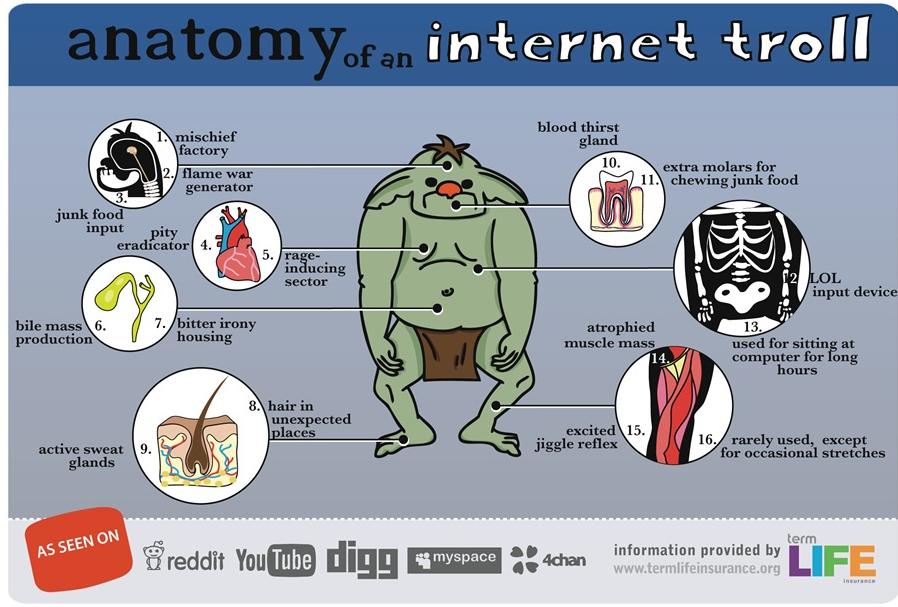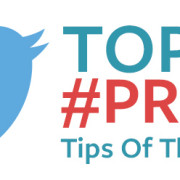When & How To Deal With Internet Trolls
“In Internet slang, a troll (/ˈtroʊl/, /ˈtrɒl/) is a person who sows discord on the internet by starting arguments or upsetting people, by posting inflammatory, extraneous, or off-topic messages in an online community…either accidentally or with the deliberate intent of provoking readers into an emotional response or of otherwise disrupting normal on-topic discussion.” (Wikipedia)
It’s inevitable: you will encounter an internet troll at least once in your life, especially if you are a frequent blogger, tweeter, vlogger, person of interest etc. There are people out there who lurk in the shadows behind their computer preying on individuals who voice an opinion or present an idea that is different from their own. Nothing you say or do will stop them from making nasty comments.
There are varying levels of internet trolls that you should know about. Some produce harmless, negative comments that might annoy you or anger you, while others threaten harm or even death. How do you differentiate between the trolls, and when should you react?
Aggressive troll: If you’ve ever scrolled down to the comments section on YouTube (it’s a guilty pleasure), you will find the worst of the worst when it comes to internet trolls. This type of troll is easier to spot. They use profanity, racial slurs, wish death upon the author of the content, bodily harm, harm to their family or employees, and other violent things. Don’t let this type of troll get to you. Trolls survive off of defensive, over-emotional responses, and they feed on those victims who respond that way. Don’t take it personally. Let’s use an example:
Anonymous writes, “This blog post sucks. I hope all your fingers get broken and you never get to write again because you clearly have no brain function to produce decent ideas. I also hope you get in a car accident that permanently disables you because this planet has no use for you,”
Ouch. Your heart is racing, you have never read such awful things being wished upon you, and you want to respond emotionally because you don’t deserve such a fate. Stop. Breathe. No matter how nasty the comment is, don’t take it personally. Chances are you have never met this person in your life and you never will. You have three options on how to deal with the comment: erase and forget about it, ignore it, or respond politely.
“Thanks for the feedback. What sort of topics would you like me/us to cover in the future?”
If the troll responds with more aggression, you can ignore it. If there is no constructive criticism, you will gain nothing from it. Remember that you are not posting content online in order to preserve or defend your sense of self. You’re posting content that represents your ideas, your opinions, your product, your creativity, etc. Not everyone will agree, and that is ok.
The troll trying to change the world: You will come across this troll by voicing your satisfaction with a certain product, company, political or religious stance. This troll will come out of nowhere and attempt to make you feel embarrassed about your personal opinion by stating facts that support the opposing view. They may or may not include any curse words or racial slurs. Respond in a passive, emotionless way. Thank them for their input, state your own facts if they’re questioning your brand or product, ask how it could be improved, and move on.
The fake profile troll: This troll will create an account on a social media site posing as a somebody else or somebody you might know. They will try to get a rise out of you by spreading rumors, sending vicious messages, threats, and posting inappropriate photos where they may tag you. This could be a difficult troll to ignore, but ignoring them is your best weapon of defense. Do not argue with them, and certainly do not threaten legal action as that can only worsen the situation. Block that person from your own account and continue to do so even if they keep making new profiles. Trolls eventually tire and go onto the next victim when the current one isn’t giving in. The only way you will win is by remaining calm and collected – or at least appearing so.
Sources:
http://www.prdaily.com/Main/Articles/How_to_deal_with_vile_nasty_comments_online_11553.aspx
http://en.wikipedia.org/wiki/Troll_(Internet)
http://www.webroot.com/us/en/home/resources/tips/pc-security/you-cant-win-an-argument-with-a-troll
http://www.business2community.com/blogging/how-to-handle-nasty-comments-on-your-business-blog-0570591














Trackbacks & Pingbacks
[…] Do not feed the trolls. […]
[…] Do not feed the trolls. […]
[…] Do not feed the trolls. […]
[…] Do not feed the trolls. […]
[…] Do not feed the trolls. […]
[…] Do not feed the trolls. […]
[…] Do not feed the trolls. […]
[…] Do not feed the trolls. […]
[…] Do not feed the trolls. […]
[…] Do not feed the trolls. […]
[…] Do not feed the trolls. […]
[…] Do not feed the trolls. […]
[…] Do not feed the trolls. […]
[…] Do not feed the trolls. […]
[…] Do not feed the trolls. […]
[…] Don’t feed the trolls. […]
[…] Do not feed the trolls. […]
[…] Do not feed the trolls. […]
[…] Do not feed the trolls. […]
[…] Do not feed the trolls. […]
[…] Do not feed the trolls. […]
[…] key in avoiding online backlash and trolls is proper management. Problematic posts must be solved in a quick, professional and friendly […]
[…] via embracedisruption.com […]
[…] […]
[…] The Anatomy of an Internet Troll […]
Leave a Reply
Want to join the discussion?Feel free to contribute!